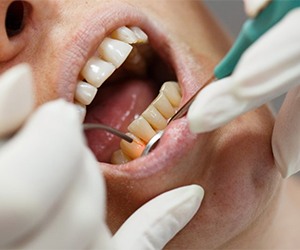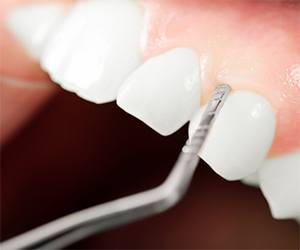








When you brush and floss your teeth, do your gums bleed? While it may seem like not a big deal, bleeding gums is one of the first symptoms of periodontal (gum) disease. This condition is the leading cause of adult tooth loss in the United States, which is why it’s increasingly imperative that our patients are aware of how to prevent it. When gum disease can’t be wholly prevented, it’s best to seek treatment as soon as you can to avoid any of the numerous complications that can arise. Gum disease treatment in Portland typically involves a procedure called a dental deep cleaning, also known as scaling and root plaining. Continue reading below to learn more about what this treatment entails.

After Dr. McInnis has looked at your x-rays and determined that a dental deep cleaning is necessary, we can begin the process of treatment. The first step is called scaling, which is designed to remove plaque and its hardened form, tartar or calculus, from your teeth both above and below the gumline. Your dentist in Portland will utilize an ultrasonic scaling device to break apart plaque and tartar from the surface of the affected teeth. Then, using a manual dental tool, she will scrape away any plaque or tartar that remains.

During this second stage of a dental deep cleaning, Dr. McInnis will smooth out the rough edges of the roots of your teeth that have been affected by periodontal disease. This step of the process removes plaque and tartar from the roots and greatly reduces gum inflammation. Additionally, bacteria will have a much more difficult time sticking to the tooth roots in the future, significantly decreasing the chances of re-infection down the road.

Gum disease presents a whole host of unwanted symptoms, like chronic bad breath and bleeding gums in Portland. Besides the fact that these symptoms are annoying, they can lead to serious consequences if you don’t get your condition treated. The increased number of bacteria in your mouth can permeate your gum tissue and access your bloodstream, traveling to other areas of your body and resulting in other health problems such as heart disease, Alzheimer’s, and type 2 diabetes.
In addition to all of these systemic health issues, gum disease can cause severe tooth loss if not dealt with soon enough. Bacteria can attack the gum tissue and bone that keep your teeth firmly anchored in your mouth, causing them to loosen and eventually fall out. That’s why if you notice any of the symptoms of gum disease, like red or swollen gums, persistent bad breath, or pus around your gumline, you should contact us right away for an evaluation.